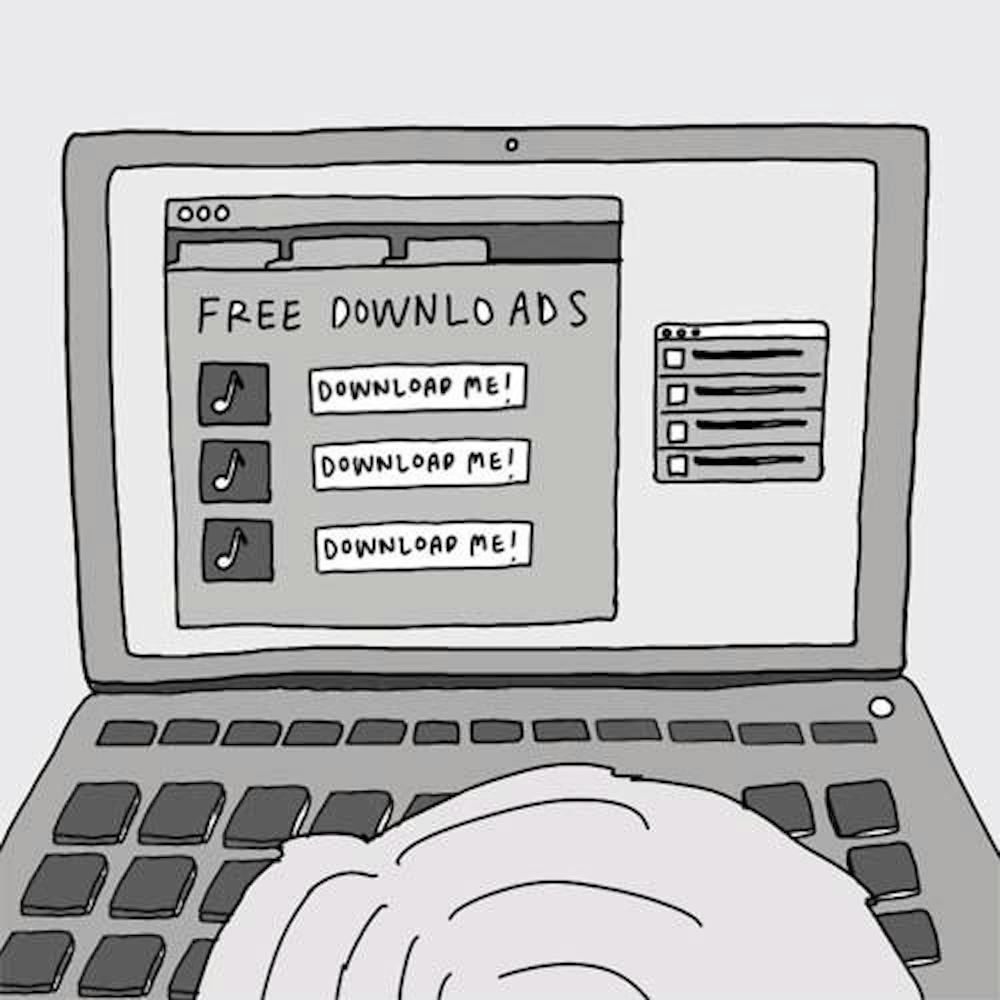Despite ethical and legal concerns, practice is widespread
(Ann Truong | The Beacon)
By Harry Blakeman, Staff Writer blakeman15@up.edu
When sophomore Preston Walker wants to download a new single, he doesn't head to iTunes or Amazon. Instead Walker, like many others, illegally downloads the music.
"It's so frequently done, it's just something that's normal," said Walker.
Recently, The Pirate Bay, a highly-popular BitTorrent site, was temporarily unavailable worldwide, as governments across the globe continue to combat online piracy. The loss of the site had little effect on University of Portland students living on campus, as BitTorrent protocol - a popular way of downloading copyrighted works illegally, that differs technically from regular downloading - is blocked by UP's firewall.
Research shows that illegal downloading is popular for some age groups. A survey conducted by Columbia University in Feb. showed that 70 percent of 18 to 29 year-olds pirate music, as compared to 46 percent of all other adults.
Because illegally downloading is theft, the impact on the music industry and the ethical choices of many young people have been brought into question.
Sophomore Michelle Murphy understands why piracy is illegal, but thinks the Internet changes the dynamic somewhat.
"It's very impersonal, there's no one in the store to see who makes you feel guilty," said Murphy.
Murphy says that she downloads movies, games and software too, and believes lots of her friends do as well.
Walker thinks that artists make so much money that their piracy has virtually no effect on the act.
"Albums aren't really what an artist uses to make a profit," said Walker.
Sophomore Nicole Hay agrees. She thinks that with services like Spotify, YouTube or Grooveshark, programs that allow users to listen to copyrighted works legally, the effect that piracy has on the copyright holder is minimal.
"I go to enough concerts that if I really want to support a band, I do so in a way that's not buying the album," Hay said.
Hay said she thinks whoever initially makes the music available illegally is the one stealing from the artist.
"Someone else put it online - they're doing the real stealing," she said.
Fr. Gerry Olinger, vice president of student affairs and a lawyer, thinks that this mindset is dangerous and can be somewhat of a slippery slope.
"What we do and the decisions we make reflect the kind of people we are," Olinger said.
He believes that the justification for online piracy can easily be applied to other forms of theft, such as tax fraud or academic dishonesty, and thinks that intellectual property is just as valid as physical property.
"The reality is that whatever the property is, people put legitimate work into it," Olinger said.
Sophomore Jenna Bunnell thinks that pirating music is unethical and continues to buy her music, but said most students don't think this way. She believes that what artists do requires skill and creative thought, and that they deserve to be rewarded for that.
"I can't make music like that," said Bunnell.
Philosophy professor Jessica Logue thinks that piracy is an ethical issue.
"The idea that if everyone does this, can, should be allowed to do this, will put the artists out of business," Logue said.
Logue said she understands that music is expensive and adds up, especially for college students, but believes there are plenty of legal alternatives that would prevent a piracy free-for- all. She said that technology has surpassed our understanding of intellectual property, and that just because people are not in a physical store, they think piracy doesn't affect anyone in a tangible way.
But sophomore Natalie Mecham takes online piracy seriously, arguing that the whole music - making process, even for Top 40 hit-makers, requires teams of people who don't necessarily get compensated as well as the artist.
"Creativity, effort and trade skills go into making it. Even some crappy pop song takes a long time to make," Mecham said. "Through pirating you're overlooking what they do and it's something of an insult to them."








